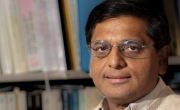Umeshwar Dayal

Palo Alto
Biography
Dayal has a track record of over 30 years of research accomplishments in data management and analytics. He has received the highest recognition in this field, the Edgar F. Codd Award in 2010 from the ACM Special Interest Group on Data Management for fundamental contributions to data management. These contributions include basic techniques for managing federated databases, defining mechanisms for triggering transactions and database rules, and investigating query optimization strategies, especially in heterogeneous systems. In 2001, he received the prestigious 10-year best paper award from the International Conference on Very Large Data Bases for his paper on a transactional model for long-running activities, which was deemed to have been the most influential paper published ten years earlier at the conference. In 1999, he was a finalist for the ACM SIGMOD Test of Time award, given to the most influential paper published ten years earlier, for his paper on the architecture of an active database system. He is also a recipient of a Distinguished Alumnus award from the Indian Institute of Science (IIS) during its centennial year in 2010 -- he is the first alumnus in 30 years of the Computer Science and Automation department of IISc to have received this honor. Dayal was named an ACM Fellow in 2009.
Dayal joined HP Labs in 1992 as Manager of the Database Technology Department. In this role, he initiated and led pioneering research projects in federated data management, business process management, and in-memory databases. Each of these projects resulted in a commercial product from HP, including TimesTen, the first general purpose in-memory database system in the world, which was spun off as a separate company and later acquired by Oracle. Realizing the importance of analytics research to HP, Dayal created the first data mining research program at HP Labs in 1996, which he grew from three researchers into the Data Mining Solutions Department of 15-20 researchers. This team created several technologies that were transferred to the Customer Support and services businesses. As part of this research in data mining, Dayal created the first research effort at HP Labs in information visualization and the emerging field of visual analytics, which combined visualization with algorithmic analytics.
Prior to joining HP Labs, Dayal was a senior researcher at DEC's Cambridge Research Lab, Chief Scientist at Xerox Advanced Information Technology and Computer Corporation of America, and on the faculty at the University of Texas-Austin. Dayal received his PhD from Harvard University in 1979. His thesis was the first to study schema mapping problems in database systems, and influenced subsequent research on view mappings and schema transformation. He received his M.E. and B.E. degrees from the Indian Institute of Science, Bangalore, India, in 1976 and 1974, respectively.
His research in the mid-1980's on Multibase, the world's first large-scale heterogeneous distributed database system, paved the way for research over the last two decades at universities and industrial research labs (HP Labs, IBM Research, and elsewhere) in data integration and federated databases. The loosely coupled approach championed by Dayal in Multibase became the foundation of the next generation of projects on integrating multiple data sources, including HP’s Pegasus project and IBM's Garlic project, and influenced several commercial products from HP, BEA, and IBM. This continues to be a hot research area of practical importance today (due to the enormity of the problem customers are facing in integrating information systems within the enterprise and in the Cloud), and Multibase’s influence is still being felt. Other important projects which Dayal led include PROBE, one of the first extensible database management systems, and HiPAC, an active database system for real-time applications. The event-condition-action (ECA) rule model introduced in HiPAC has now been widely adopted in reactive computing systems, complex event processing systems, and distributed middleware. This model also influenced the design of trigger capabilities in the SQL standard, which is now implemented in nearly every commercial relational database product. Dayal has also made significant contributions to query processing research, with particularly strong contributions to the processing of multi-database, queries, and spatial and recursive queries. The approach described in his VLDB 1987 paper on unnesting SQL queries was later adopted in at least five commercial products (including Oracle, DEC's Rdb, and HP's Neoview). In addition, Dayal has done pioneering work in long-duration transactions, business process management, and database design. In particular, he pioneered the field of business process intelligence, a field of study that combines data warehousing, data mining, analytics and optimization techniques to monitor, control, analyze, and optimize business processes.
Publications and professional activities
He has published over 200 research papers and holds 45 patents in the areas of data management, transaction processing, business process management, business intelligence, analytics, and information visualization. He has given over 40 keynote and invited lectures at international conferences and workshops.
Dayal is currently Chair of the Board of the NSERC Business Intelligence Network, a research network of universities and companies in Canada. He has served on the Editorial Board of four international journals (including ACM Transactions on Database Systems and VLDB Journal). He has chaired numerous conferences, and serves regularly on program committees of the premier data management and data mining conferences. He is currently on the Steering Committees of the IEEE International Conference on Data Engineering, the ER Conference on Conceptual Modeling, and SPIE Conference on Visual Data Analysis. He has served as a member of the Board of the VLDB Endowment, a member of the Executive Committee of the IEEE Technical Committee on Electronic Commerce, a founding member of the Board of the International Foundation for Cooperative Information Systems, and a member of the Steering Committee of the SIAM International Conference on Data Mining.